
|
 |

|
 |
Unsung characters for adaptation in dance (Part 2)- Dr. Padmaja Sureshe-mail: padmajasuresh@hotmail.com June 28, 2025 Unsung characters for adaptation in dance (Part 1) The development of different Sanskrit dramatic literature and poetry had parallel narrative structures and themes from the Mahābhārata. Some have become immortalized just like the main epic through the medium of folklore, poetry, drama and dance, while there are many that have hardly been noticed or remotely thought of with aesthetic purpose. Dance drama art forms like Kathakali, Yakshagāna, Harikatha and Koodiyāttam preserve the Sanskrit lineage within a limited repertoire. The Naḷa-Damayanti story, Kiratārjuniya, Karnashapadam, Kalyānasougandhigam, Sishupāla Vadha, Keechaka Vadha and few others have become adapted prominently. 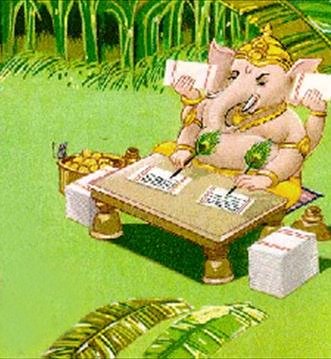 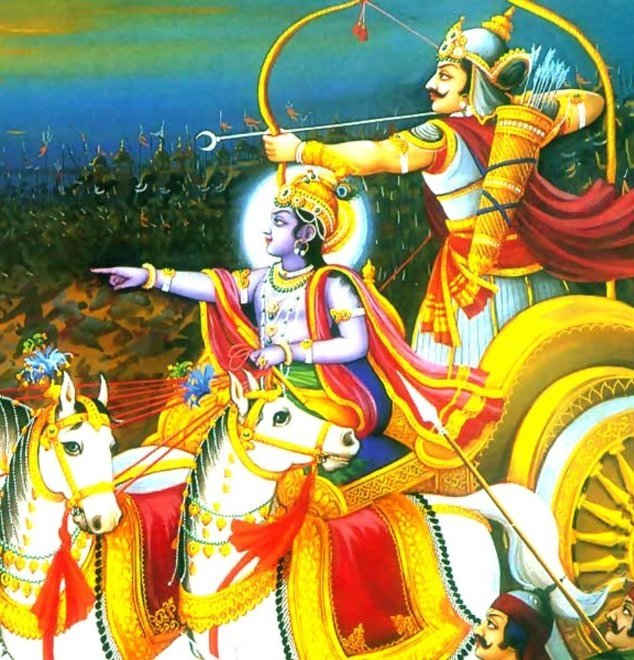 Folk tales like the cat and mouse, the wicked fowler and the compassionate pigeons offer advice on conduct and practical life. Good governance, features of capable statesmen, leaders, soldiers, merchants, womenfolk, families and in fact every walk of life is covered. There are few episodes like that of Ekalavya - Dronācharya, the Khāndavavana forest fire or even Karna that may raise questions on social inequality. While such incidents are interpreted on common social levels, the justification for such acts are a series of inter-connected events which may have the larger purpose of righteousness in the war of good over evil. 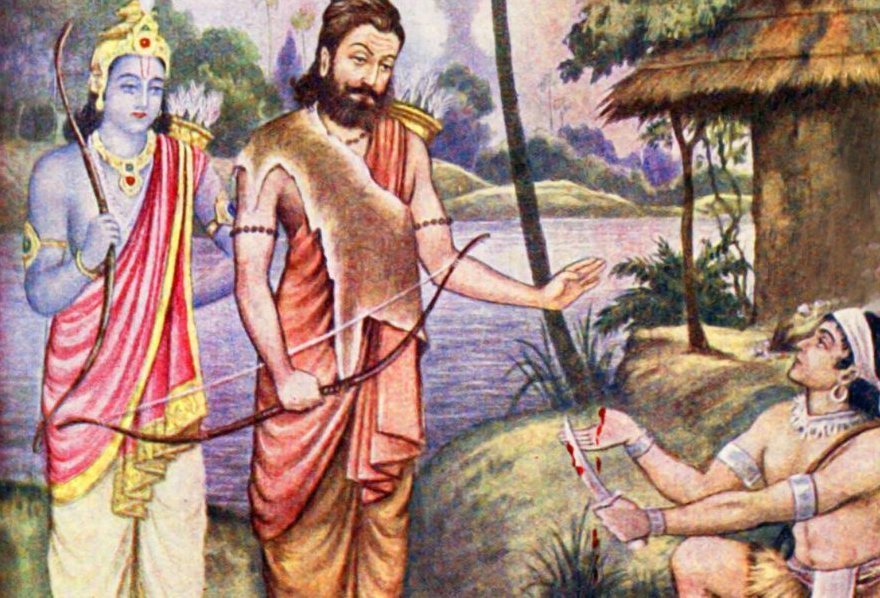 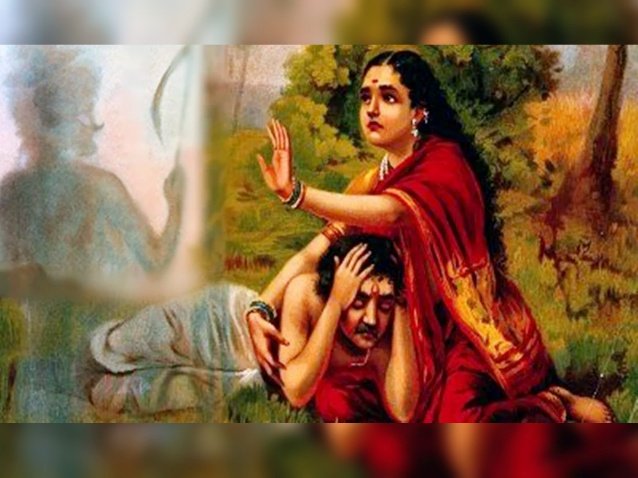 Adi Parvan is a prelude to the Snake Sacrifice. There are a hundred Upa Parvas situated in the first of the 18 Mahā Parvas. We all know the story of Savitri with Yama who brought her deceased husband back to life. The story is a good part of theatre used widely as is Shakuntala [popularized by Kalidasa with some changes from the original]. But hardly known are Tapati or Pramadvarā or the sacrifice of Ruru as told in this fourth section - Upaparvan. Ruru and Pramadvarā Ruru and Pramadvarā is a story of undying love. Cyavana (Bhrugu's son) had a son Pramati whose son Ruru fell in love with the beautiful Pramadvarā, the daughter of Menaka, the Apsara, and Viśvāvasu, the Gandharva. She was raised by Rishi Sthūlakeśa, just as Shakuntala was raised by Kanva. Their wedding was fixed but days before this, the bride-to-be stepped on a snake and died of snake-bite. Ruru was lamenting unconsolably when a messenger from heaven appeared and gave him a solution. He said that if Ruru was to give up half his life span to her, then she would live. Ruru accepted happily and the messenger negotiated this agreement with Yama Dharmaraja. They were married and led a life of joy. The latter half moves from love centredness to hatred and then compassion. Ruru was angry with the Nāgas thereafter and killed one whenever he saw it. A snake Ḍuṃḍubha who was sage Sahasrapāda waiting to be delivered of a curse, when attacked by Ruru, resumed his human form. He advised Ruru that a Brahmin should be kind and never take a life. That an Uttama Nāyaka like Ruru could let go years of his own life, is well noticed. 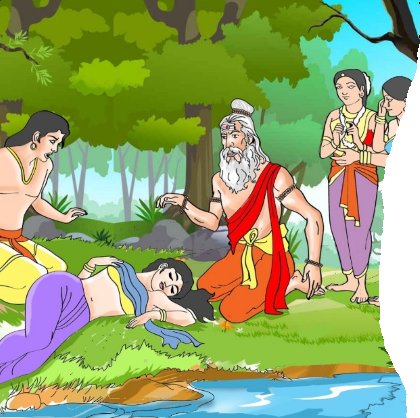 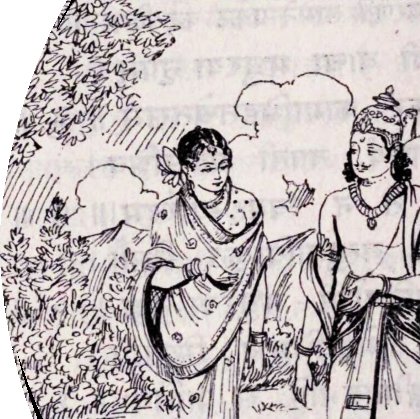 Tapati Tapati is a daughter of Sūrya and Chāya. Tapati means the burning one. It had been said that no one could match her in beauty and self-discipline. In Mahābhārata [Adi Parva, Chaitraratha Parva], when the Pandavas were travelling to Draupadi's Svayamvara, they encountered a Gandharva named Chitraratha. When they were attacked by Chitraratha, Arjuna had to fight, following which the Gandharva became their friend. He addressed Arjuna as 'Tāpatya' [a descendent of Tapati] as Tapati was one of their ancestors. Tapati was equal to Sūrya and the younger sister of Savitri. She was most revered and herself devoted to penances. The mighty King Saṁvaraṇa was duly worshipping the sun God. Once, when he was on a hunting expedition, he lost his steed and began to wander about when he saw a beautiful golden hued maiden. But like the lightning, she disappeared causing utmost grief to the King. She then returned and revived him as he had become motionless. He asks for her hand and to wed him in the Gandharva style, suited for Kshatriyas. Tapati directs him to seek her hand from her father, Aditya. The King then sat to worship, while Vasishta came there on the twelfth day to inform Sūrya that Saṁvaraṇa was virtuous and a worthy husband. Sūrya gave his consent for the marriage and the couple were enjoying for twelve full years. This later caused severe drought, thirst and hunger. Vasishta resolved upon bringing Saṁvaraṇa along with Tapati back to rescue the land and thereafter, the couple performed sacrifices for twelve years. Indra and the Gods poured rains in abundance as a result. Gāndhārī Stri Parvan deals with the trauma and grief of women after the Kurukshetra war. Gāndhārī was a princess of Gāndhāra (modern day Kandahar) noted for her piety and virtuous nature. She was regarded as an incarnation of Mati, the goddess of wisdom. She was born as the daughter of King Subala. Her marriage was arranged by Bhishma. During her maiden days, she is said to have impressed Lord Shiva through penance and received a boon to bear 100 children. One of the main reasons of Bhishma choosing Gāndhāri is said to be this boon, so the throne will not remain vacant ever. She decided to blindfold herself in order to be like her blind husband. Folklore and some versions of the Mahabharata depict her marriage as a major reason for the story's central conflict. Her brother, Shakuni, was enraged that Hastinapur, having humiliated Gāndhār where all of Shakuni's brothers were killed, would give his prized sister to a blind man. Gāndhāri made a single exception to her blindfolded state, when she removed the eye mask and poured all her power into her son's body in one glance, rendering Duryodhana's entire body [except his loins], as strong as thunderbolt. All of Gāndhāri's sons were killed and it is said that through a small gap in the blindfold, her gaze fell on Yudhishthira's toe which was charred black due to her wrath and power. The Mahābhārata attributes high moral standards to Gāndhāri. She repeatedly exhorted her sons to follow Dharma and make peace with the Pāndavas. She fostered a sister-like relationship with Kunti. When Duryodhana would ask for her blessing during the Kurukshetra battle, she would only say, "May victory find the side of righteousness". 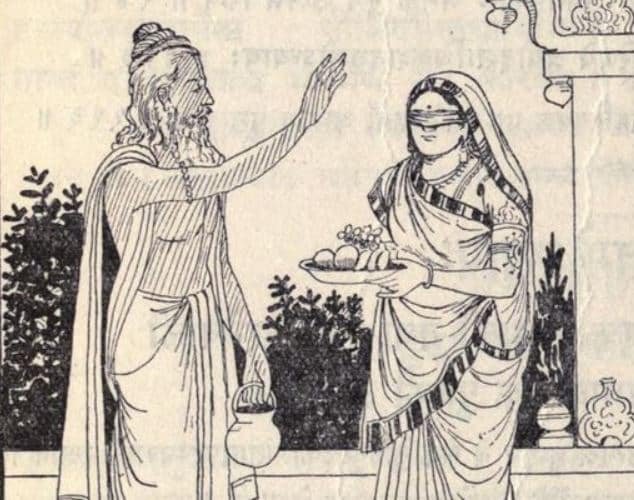 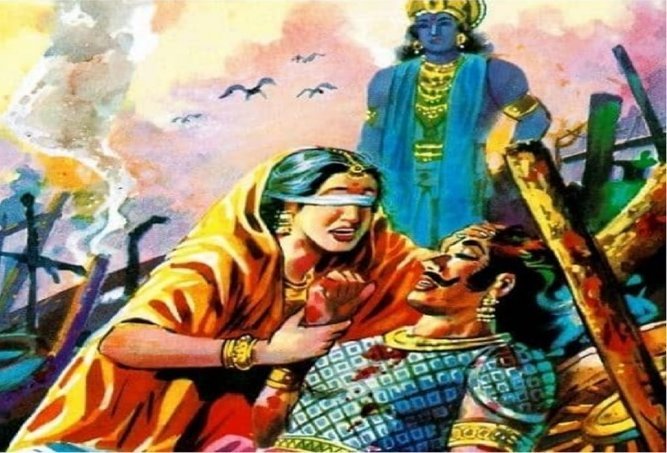 After the war, Gāndhāri faced Kṛṣṇa - [Ezhuthachan's mahābhāratam kilipāttu] "Oh Kṛṣṇa, The divine son, who has an auspicious, pretty form resembling an emerald stone,Then comes her curse: "You who have very many friends, along with your entire family would all together die like this, without any doubt when thirty six years go by."Says Kṛṣṇa in response: "It should come like that only, is the firm desire in my mind also, Oh lady, Good has happened to you and to me, possibly that is the resolve of great God." The twins and their mother Nakula, most good looking had the ability to speak with animals, veterinary medicine, horse breeding while Sahadeva was highly knowledgeable, excelled in astrology, face reading, divine qualities, martial arts. Both were also skilled warriors and proficient in Ayurveda. 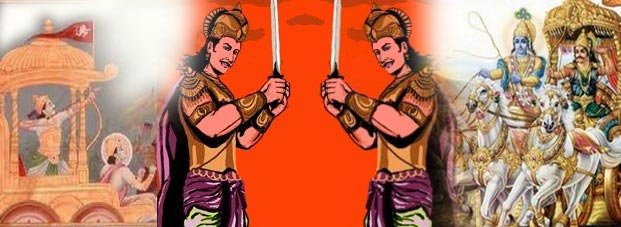 Mādrī is arranged to marry Pandu by Bhishma to strengthen ties between the Kuru and Madra kingdoms. Pandu, however, is cursed to die if he ever touches his wife. Nakula and Sahadeva, are born through the divine boon of Kunti. Pandu's desires eventually overcome him, leading to his death. Overcome with remorse and grief, Mādrī entrusts her sons to Kunti and commits self-immolation on Pandu's funeral pyre, one of the earliest examples of sati. Kunti raises the boys with great affection. Incidentally, Kuntī was the sister of Śrī Kṛṣṇa's father Vasudeva. Her real name was Pṛthā. Vasudeva and Pṛthā were the children of King Śūrasena of the Yādava dynasty. 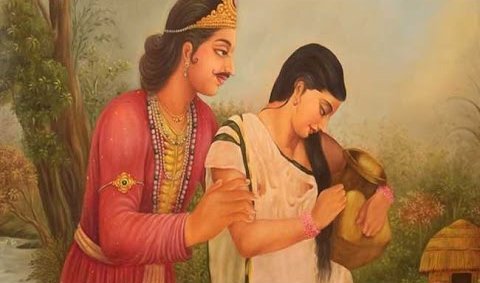 Abhimanyu achieved martyrdom in the war and his wife Uttara wanted to become a Sati for her husband's sake. Due to the presence of a child (Parikshit) in Uttara's womb, Kṛṣṇa did not allow her to do so. To honor her, Kṛṣṇa granted her the boon that her desire would be fulfilled in the Kali Yuga. Incidentally, the revered deity of the Mārwari community, Rani Sati Dādi (Grandmother), is also known as Mā Nārayani, whose avatār took place seven hundred years ago in a village called Dokwa. Uttara was born as Nārayani Bai at Seth Gursamal's place, endowed with some divine powers since childhood that astonished the villagers. Abhimanyu's reincarnation, in the form of Tānadhan, occurred at the place of Seth Jaliram. 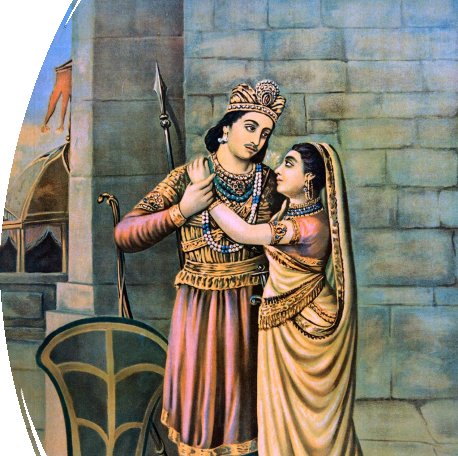 Subhadra, Satyavati, the trio Amba sisters, Sulabha, Pancacuda, Suvarcala are other interesting characters in the epic, worthy of dramatic elements. Unsung characters for adaptation in dance (Part 3) 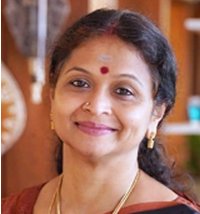 An acclaimed dancer researcher and author, Dr. Padmaja Venkatesh Suresh is well-known for her immaculate insight into esoteric sciences, corelated with years of training and experience. Having toured extensively with her lectures, workshops and thematic performances, she leads Aatmalaya Academy, Bangalore, that propagates the cause of Sanatana Dharma and Vedic values through the arts. A PhD in dance and philosophy, she has several awards to her credit. Post your comments Pl provide your name and email id along with your comment. All appropriate comments posted with name & email id in the blog will also be featured in the site. |